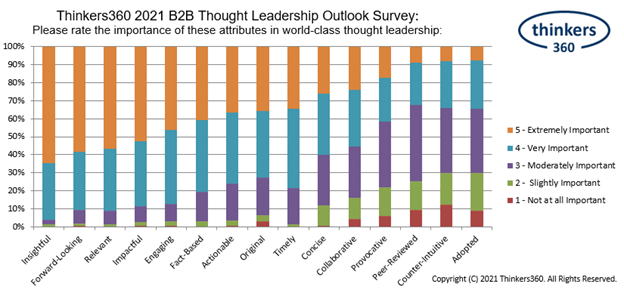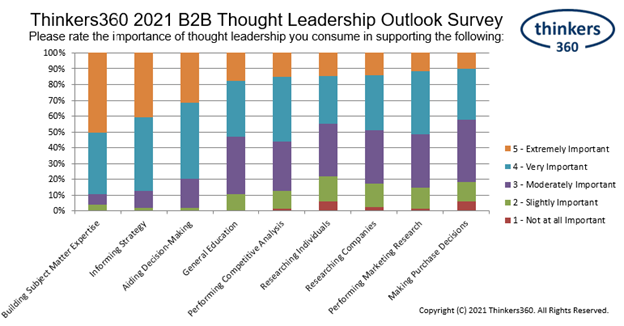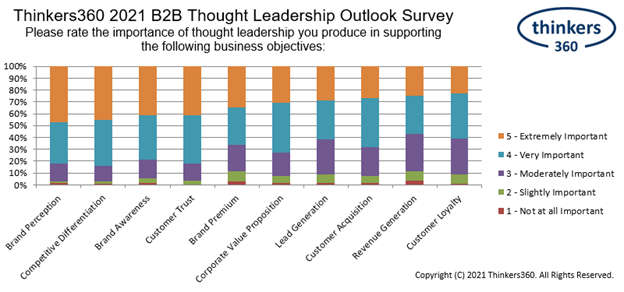In association with BCS, the Thinkers360 survey analyses thought leadership content from a writer’s and reader’s perspective. Your input is welcomed, writes Nick Evans FBCS.
In her president’s message in the 2020 Annual BCS Report, Rebecca George OBE, Immediate Past President (2021-2022), stated that: ‘Tech is now at the forefront of the most high-stakes decisions being made about people.’
With BCS’ focus on making IT good for society, this is precisely why thought leadership is becoming increasingly important for helping us make decisions related to business, technology, and sustainability, not only for ourselves but for our businesses, our communities and for society at large.
In fact, according to our research, among consumers (i.e. readers) of thought leadership content, 80% state that it is extremely important or very important for aiding decision making.
Every year, Thinkers360 conducts primary research to better understand current and future trends with regard to both thought leadership producers and thought leadership consumers and their plans for the year ahead. This year, we’re delighted to be conducting our research in conjunction with BCS. We invite you to be a part of this conversation and share your perspectives by taking our online survey any time until 24 September 2021.
We look forward to sharing a complimentary copy of the results of this research with BCS and Thinkers360 Members. All participants will also be eligible to enter our draw for one of three, free, 1-Year Pro Plan Memberships to Thinkers360 - to further amplify your personal brand and share your perspectives with our opt-in community of B2B thought leaders and influencers with over 100M followers on social media combined.
Key attributes of thought leadership
So, what are the key attributes of thought leadership content and how is it evolving? In our prior research, we found that today’s thought leadership content is far different from its traditional stereotype. It no longer has to be peer reviewed, counter-intuitive or even collaboratively produced. In fact these, traditional notions of thought leadership such as ‘peer-reviewed’ (42%), ‘provocative’ (36%) and ‘counter-intuitive’ (36%) were cited by the majority as only moderately important.
The key is insightful, forward-looking content that’s timely, relevant, impactful and engaging. Thought leadership consumers cited ‘insightful’ (96%), ‘relevant’ (91%), ‘forward-looking’ (91%) and ‘impactful’ (89%) as extremely important, or very important, attributes of thought leadership. It also has to be actionable, original and concise - all of which out-ranked the more traditional notions listed earlier.
Benefits of thought leadership (thought leadership consumer perspective)
From a thought leadership consumer perspective (i.e. readers of thought leadership content), we found that ‘building subject matter expertise’ (89%), ‘informing strategy’ (87%) and ‘aiding decision making’ (80%) were rated as extremely important or very important.
And, while ‘making purchase decisions’ was only rated as extremely important by 10%, a total of 82% cited it as moderately important or higher.
While motivations and benefits of consuming thought leadership content vary widely, over 78% consider it moderately important or higher across all potential benefits.

Benefits of thought leadership (thought leadership producer perspective)
From a thought leadership producer perspective (i.e. creators of thought leadership content), we found that ‘competitive differentiation’ (84%), ‘brand perception’ (82%), ’customer trust’ (82%) and ‘brand awareness’ (79%) were rated as extremely important or very important attributes of thought leadership. All ten thought leadership benefits were cited as moderately important or more by over 88% of participants.
Today’s thought leadership producers are primarily using their thought leadership content for the front end of their sales and marketing funnel to improve their brand awareness and perception, customer trust and competitive differentiation.
Even downstream benefits such as lead generation, revenue generation and brand premium were cited by over 57% as either very important or extremely important objectives.

Specialist communities such as BCS are key
In last year's research we also found that specialist communities are key to both sourcing and disseminating thought leadership perspectives and content.
For you
Be part of something bigger, join BCS, The Chartered Institute for IT.
Thought leadership consumers cited ‘specialist communities’ (57%) and ‘social media channels’ (50%) as their primary sources for thought leadership content. All other destinations were seen more as secondary sources than primary sources with ‘vendor websites’ seen by over 34% as not applicable. Specialist communities (such as BCS and Thinkers360) and social media appear to be the tip of the spear for access to thought leadership content.
Thought leadership producers cited ‘social media channels’ (79%), ‘specialist communities’ (58%), ‘conferences & events’ (52%) and ‘individual websites’ (48%) as their primary outlets for thought leadership content. All other destinations were seen more as secondary outlets than primary sources with ‘academic websites’ seen by over 50% as not applicable.
Moving forwards
With so many high stakes decisions to be made on topics ranging from diversity and inclusion to sustainability, artificial intelligence, cybersecurity, healthcare, education and much more, thought leadership from BCS members and their peers is becoming more important than ever to help guide and inform these decisions so we can take the best steps to make IT good for society.
We hope that you can use our annual research as a guide to help determine how best to share your thought leadership and the content types and distribution channels that will provide the best traction for your insights and advice.
Take the Thinkers360 Though Leadership Outlook Survey today
About the author
Nick Evans is founder of Thinkers360 and author of the BCS book, Mastering Digital Business. One of Consulting magazine’s top 25 consultants, and one of ComputerWorld’s premier 100 IT leaders, he has 25 years of consulting under his belt and is also a widely-recognised digital business speaker and author. He can be reached at nick@thinkers360.com.

















